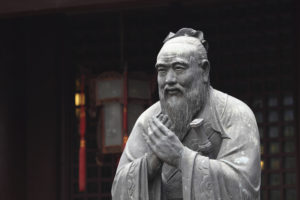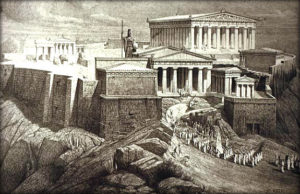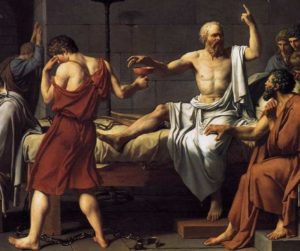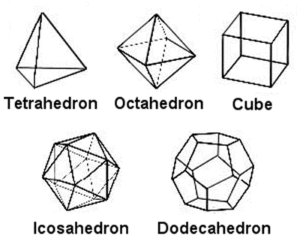Taoism and Confucianism
In the State of Chou (late in the 6th century BC), there met two of the world’s greatest philosophers, Lao-Tse, the mystical seer, and Confucius, the ethical sage. This was during the very time of the Buddha Gautama’s enlightenment and teaching in India, also a hundred years before Socrates and the flowering of Greek philosophy, and more than 500 years prior to the ministry of Jesus in Palestine.
Confucius and Lao-Tse met as strangers although their reputations had spread far and wide within the Chinese feudal states. Both men envisioned salvation for men during a turbulent and degenerate period and a return to the conditions of the “Golden Age.” To Confucius that meant a period when rulers were benevolent and virtuous and subjects were law abiding and loyal. To Lao-Tse the Golden Age was a time before rulers and laws were necessary; when man lived in communion with Spirit in natural innocence and in harmony with the universe and thus required no instruction to act nobly (in contrast to Confucius’ teachings on respectfulness, lawfulness and morality).
Lao-Tse was a librarian and keeper of the secret archives of the State of Chou. Confucius had believed that Lao-Tse, who was both archivist and sage, would have learned a great deal about the laws and rituals of the old times, and that such knowledge would be invaluable for the reforming of society. He took with him a retinue of disciples and pupils to meet with Lao-Tse. However, Confucius’ questions only brought disagreement, chiding even, from Lao-Tse.
It is speculation to claim knowledge of how much of Lao-Tse’s philosophy he outlined to Confucius. Perhaps, author Sheldon Cheney, “Men Who Have Walked with God,” suggests, he spoke of his favorite doctrine of the Tao, or Way of Heaven: of the spiritual oneness of All that Is; of the natural as opposed to the artificial man and of man’s necessity to conform with the rhythm of life; of action without assertion; of non-interference; of the need to have quietude in the soul [to access this natural, perfect state] and of the innate honesty and compassion of people not otherwise educated to shrewdness and righteousness.
Confucius, it is said, went away discomfited, knowing that a vista had been opened upon a majesty and mystery he could not fathom; that he had been afforded a glimpse into the Golden Age beyond his conceiving. Regardless, Confucius went on to become the world’s greatest ethical teacher – “The Perfect Sage” as he was referred to. He wrote books on instruction and admonition to teach millions how to be virtuous, respectful, and thrifty. Other than Lao-Tse, Confucius undoubtedly helped more than any other to further the Chinese people towards a law-abiding, virtuous, and philosophical nation of peoples.
(1)
Chang-Tse, Lao-Tse’s apostle, reported long afterwards, that at a later meeting of the two sages Lao-Tse cautioned Confucius in response to an abstract of his works “The Twelve Classics” (advocating charity and righteousness) against introducing confusion and disorder with his moral meddling. Chang-Tse quotes Lao-Tse as having said “Take care, my young reformer, not to interfere with the natural goodness of the heart of man. It is possible to excite it unduly.” “… In repose it is profoundly still, capable nevertheless of every freedom, of every orderly [perfect] movement, of heavenly flight.”
It is important to note however, that despite Lao-Tse’s focus on the ultimate goal of the soul to attainment of oneness with The Source he nowhere states disapproval of his countrymen’s reverence for their ancestral chain linking the individual to The Source. More on this later.
A few years following their last meeting, Lao-Tse quit his post as archivist and left the Kingdom of Chou never to be heard from again. It was believed that he went westward to a realm that preserved the conditions of the Golden Age, where rules and rulers were unknown and life was not interrupted by the change called death. And, where one such as Lao-Tse, took his place amongst the Men of Perfect Wisdom; a spiritual land where the distinction between gods and men is unknown. Cheney elaborates on this concept of the spiritual land though there are those who rightly claim that mental imaging is too inferior for an understanding of this Holy Realm: that it is the ocean of Spirit Eternity, the Infinitude, the Absolute, assimilation with the Divine thus transcending creation, mortality, and reason. In other words, the author adds, an eternal paradise as is commonly conceived of in all the great religions.
To the Chinese, Cheney informs us, the Dragon, once uncoiled, goes out from the body and it is then that the Dragon Soul, riding the clouds of heaven, receives its nourishment from the Soul of the Universe. The Dragon’s element, according to ancient Chinese lore, was water but breathed fire and, as well, the winds that quicken life during the onset of Spring. And so the Dragon, the symbol of the guardian of the race, Lao-Tse was, and the one human who epitomized the spiritual genius of the Chinese.
(2)
Lao-Tan (later, once canonized in the 7th century AD, to become Lao-Tse – Tse meaning “Saint” or “Sage”) was born around 604 BC in a village known as Good Man’s Bend. He rose to be an official in the State of Chow (meaning literally, the State of Everywhere). For many years he served the King of Chow as librarian and archivist. At that time Lao-Tan had already developed the ideas of non-interference and pacifism which would not comfortably conform with his duties of a retainer at the court of an emperor and warlord. This too against a backdrop of poverty, serfdom, and plundering; the outward evidences of the decay of the civilization. Having foreseen the collapse of the proud Chou State, then later the disintegration of the empire (which came to pass within a generation) he could not stay at court and departed for the western frontier.
At the frontier, the guardian of the pass, Yin-Hi (who Taoists later immortalized for his service) recognized the sage and asked, “Since you have decided, Master, to retire from the world, I ask you to put down in a book the ideas by which we may remember you.” Lao-Tse tarried long enough to compose a poetic treatise consisting of few more than five thousand ideograms. [An ideogram is a Chinese character which does not represent a word but rather, an idea]. Then, having given the manuscript to Yin-Hi, he went through the pass never to be seen again.
“The Book of Tao,” as Lao-Tse’s composition is widely known, was initially titled “Tao Teh” then later as the “Tao Teh Ching.” Ching, meaning cannon, was added when the book was recognized as being canonical [the work of a saint or prophet] twelve hundred years after the writing. The words Tao and Teh cannot be exactly translated and therefore there have been as many different English titles as there have been English translations of the works. For example: “The Way and Its Power” by Arthur Wiley, or “The Canon of the Way and the Life” as proposed by a student of Christianity. Cheney however, states that the “Tao Teh Ching” teaches a way of, or a manner of, working with the rhythm of All of Life; a conformance to natural rhythmic processes by which the wayfarer attains Tao – or, a harmonious flow of life given him out of the infinitude of Tao.
I shall add here that one of the most fascinating fields of science I studied was cellular biology. And, one of, if not the greatest mystery in the field is the process of cellular differentiation: the process of cellular division then specialization (as in the first roughly 600 stem, or generic, cells becoming heart cells, or blood cells, or neurons, etc.) from the single fertilized egg to the adult organism consisting of approximately 75 – 100 trillion cells. How each cell, all possessing the same DNA, naturally assumes its specific anatomy, takes up its precise position and does its unique work as part of the whole of the organism is unbelievably perfect. In fact, the complex workings that go on inside each individual cell is no less remarkable. I recall lamenting that I was not nearly so well organized nor did I function as intelligently as any one of my trillions of cells. Of course, this marvel can be observed in any aspect of nature, the whole of the cosmos even. And, it is this intelligence, this creative life giving force that is at the heart of Lao-Tse’s philosophy.
(3)
Cheney states that the spirit of Lao-Tse, the inspired poet and prophet, abides in the text of the “Book of Tao.” And, if obscure and confusing in parts (to say nothing of being utterly incomprehensible to the mind that takes its stand upon rationalism and pragmatism) the book nonetheless sets out one of the great coherent systems of transcendental and practical philosophy. However, some of the confusion is due to the nature of Chinese writing, writing that is in the form of ideograms each of which cover a wide range of meanings, thus the reason for the extraordinary differences in western translations of the “Book of Tao.” Lao-Tse did not invent the word Tao. It simply means “way” which western dictionaries define as: path, direction, or manner of doing. The word Tao and its signifying a path, a philosophy of life, existed a hundred years prior to the sixth century B.C. seer, yet he gave the concept a profound and new import.
The Tao was before creation, before existence, before being. It is all that mortals have vaguely tried to convey in the words “God” and “Providence.” It is the spirit, the soul, the nature of the universe, beyond the cosmos and life, before the dualism of the yang and yin, male and female, aggressive and yielding, the luminous and the dark, and so on. It is the harmony in and amongst all processes and all things without which no thing, nor nothing, would be.
The author writes, Tao is (for, he claims, the human brain will explore every explainable aspect of the unexplainable) the harmonious interaction of man, Earth and Heaven. It is the flow of the vital essence, the moving of absolute love, the progressive order of being, growth and fruition. Man may busy himself with the affairs of the outward life, with the manifested [the material world], without regard to Heaven’s flow; he may act wholly on the plane of appearances, desires and events. But the wise man, counsels Lao-Tse, will recognize the relationship of the manifested to the unmanifested, of Earth to Heaven … and thus will enable his soul to rise into the flow of harmony – and thus embraces Tao. To merge silently, freed into the stream of infinitude is the greatest good of life.
Cheney adds, the two aims of the world’s mysticism are here set forth: First to find the eternal in given life, to feel emanation of Spirit in every manifested thing, and second to take on the sense of the flow of Spirit, to bathe in the consciousness of the stream of divinity, in union with the Soul and all souls.
What is interesting to me is that if one reads of or listens to the numerous reports of anyone’s, at any time over the course of recorded human history, either sudden and unexpected experience of enlightenment, or of the same which occurred during a state of prolonged meditation, for example, they all seem to report of, describe as best they can, a same or similar experience. And, they all say (all that I have become familiar with anyway) that the experience defies description, that it is ineffable.
(4)
Back to attempts toward defining, and this time the word “Teh” as in the title “The Canon of Tao Teh.” (Again, recall there are as many English texts with varied titles as there are English interpretations of Lao-Tse’s poems):
Teh links the individual with the purpose of Heaven. It is the rhythm of the spirit brought down to life, the unfolding of Tao into the being of the individual. It is the spontaneous flow of the “power” obtained from Tao. It is a conformance to and a movement within the natural rhythm or orderliness that Lao-Tse so extols as harmoniously animating nature. A man’s grasp of Teh begins with the sensing of the harmonious flow of a single Spirit through Heaven, Earth, and man ending in a state of peace thus acquiring the power to rise to the experience of unity, of wholeness, of communion. It is the dynamic influence compelling the “Wayfarer to the Way.”
Is it not also just as the Holy Spirit is conceived of in Christian theology?
Here is an example the author provides of a translation of one of Lao Tse’s poems:
Tao produces all things of Earth;
Therefore, let a man exalt Tao
And honor Teh, its expression;
Tao animates living things;
Teh nurtures them,
Gives them increase,
Completes them, protects them,
Provides shelter and food.
Yet Teh claims no possession,
Supplies without owning,
Guides without ruling:
In this is the clue to life’s mystic operation.
Possessing the harmonious power of Teh and attaining Tao is accomplished through the practice of Wu-Wei, a phrase commonly translated as “non-action” or, more specifically, “non-resistance” or, “action without assertion.” Lao-Tse cautioned against striving, shrewdness, and interference but did not suggest an existence of complete passivity or of inaction. Rather, the ideal is to move in accordance with the effortless movement of nature; to be at one with the flow of all of life; the orderliness and beauty of the universe.
(5)
Again, Lao-Tse points to the growth and decay in life, the alternating light of day and dark of night, the orbits of the celestial bodies around the sun, the phases of the moon, and so on. The transient reveals unending movement, ceaseless unfolding order. Yet behind all the pulsating, alternating dualism is the boundlessness of the all-embracing Tao. He advises that we take our stand upon the Spirit of Tao; its non-striving, its effortless perfection. He advises we produce no complications, no arguments, but instead fall in with the life rhythm of the Spirit and all else will be cared for.
Here I am reminded of a Christian teaching: “The turning of the other cheek.”
A practice of contemplation that Lao-Tse suggests is a discipline not unlike that of yoga. It involves a dismissal of knowledge, a deliberate stilling of the brain. It is an escape from the system of knowledge that has led man out of his original estate of natural simplicity, intuitive knowing, and genuine goodness. It leads to liberation from the false activity, the material enterprise, the law-regulated morality, and the “knowledge” that pragmatic education have brought into human life.
The man, says Lao-Tse, who lives by desire and sense satisfaction and material possessions may very well get along in life by exercise of knowledge and reason. In the Book of Tao he condemns the rulers’ struggle for power, the resort to war, the enslavement of the masses. But, he places the greater emphasis on the causes of those evils: the general, wide-spread aspiration for power, extravagant display and so-called honor. He stresses the emptiness of the enjoyment of earthly fame and of caste (or class) distinctions. Yet, Lao-Tse says, if he has no intuitive intelligence, a natural apprehension of Spirit, he will know no true fulfillment, thus no happiness in life. Action without striving implies the stilling of the restless scheming mind. It means the surrender of the self, the ego, to the leading by the Spirit instead. It is an entry into a life of simplicity, peace and compassion. Paradoxically, it also means accomplishment of the greatest deeds.
While Lao-Tse may pause to address advice to the world’s ruling class, his deepest concern is with the individual, the individual’s soul for, nothing can save the world except wide-spread personal regeneration.
(6)
Confucius died in 478 BCE and long before that Lao-Tse disappeared over the mountains toward the westward regions. At the time the country was too confused and miserable, in the midst of warfare and public destitution, to take much heed of the death of a philosopher. Yet, such was the power of Confucius’ writings and sayings and the zeal of his students and disciples that (relative) peace had hardly returned to the land when Confucianism became the guide of conduct for millions of Chinese, whereas Taoism was longer deferred for nearly twelve centuries, until 666 A.D. when Lao-Tse was canonized by an emperor of the Tang Dynasty and hailed as “The Supreme One, Mystic Author, Most High.” In one domain Confucianism would be the official Chinese philosophy for manner and conduct for daily life, and in another Taoism was considered the national faith.
Ultimately though, a religion of Taoism, departing from its pure form, took hold with divinities, temples, icons, rites, a hierarchy headed by a pope, with an extensive lower priesthood. The Taoist church went on to become entangled in a complex of witchcraft, divination and pious fraud such that the original doctrine was all but obscured. Nonetheless, Lao-Tse and the Tao he encouraged have profoundly affected the lives of millions of people providing spiritual sustenance.
Taoism, given its adaptability and a certain tolerance amongst its adherents, allowed for the inner philosophy of Taoism and the outward, ethical precepts of Confucianism to act together upon the collective soul and character of the Chinese people. Confucius said of himself that he was an adapter; a gatherer of others’ ideas about the good life. As well, he was a wise and witty composer of epigrams. And having furthered good manners and the virtues of loyalty, kindness and thrift amongst the Chinese there was still room for the cultivation of their spiritual faculties.
The founder of Confucianism was, if not a sceptic, an indifferent advocate of the spiritual life and had no notion of what it is that a mystic faith, or mystic philosophy, does for the human spirit. Therefore, for the mass of the Chinese people a wholly non-spiritual life, though lived peacefully and ethically, fails to satisfy. Taoism supplies that spirituality: the sense of a rhythmic order pulsing throughout the universe, all of nature and humankind; a divine concept that might be called God, or the Great Ancestor.
(7)
Here I shall include Cheney’s description of the concept of Chinese ancestor worship (commonly misunderstood in the western world). It is a complex of conceptions and activities permeated with mystic feeling and symbolic significance. It is the idea of creation that is exalted, revered, in a continuity of life and lineage. Each ancestor in turn becomes immortal in carrying out the chain of familial generation. He is the link backward to the procreative beginning of the Universe, to a revered all-comprehending One, including all the creators, the ancestors, of his own lineage. The ancestor is also honored as the link forward toward whatever glory shall crown humankind’s continuance.
Lao-Tse’s apostle, Chuang-Tse (who died approximately in the year 275 B.C.), was one of the outstanding writers of his time and, next to Lao-Tse, the greatest mystic seer of early Chinese history. His work as the Saint Paul of Taoism was brilliantly accomplished. As Lao-Tse left but one brief, cryptic book it fell to Chuang-Tse to elaborate and expound on the ideas of his master. His comparatively voluminous writings are filled with expositions of the harmonious nature and boundlessness of Tao, and the expediency of practicing Wu-Wei, and the ways of contemplation and attainment of illumination. For example … “When one attains highest spirituality he rides up into the glory of Heaven. His body is no more. This is called mergence into the Light. It is the realization of all one’s powers, divine as well as earthly. From the corporeal world of man he has risen joyously to God …”
(8)
The Great Philosophers of Ancient Greece
Of the nations of the western world the ancient Greeks accomplished the most heroic deeds in the realms of thought and cultural advances. Yet, while Greece played the most glorious role, it played the most tragic as well. It was in ancient Greece that western philosophy, up to this day, found its form in rational, utilitarian values and thinking.
To note some of the highlights of Ancient Greece:
The start of the “Classical Period” in Greece was sparked by great interest in the arts (sculpture, painting, poetry and drama [as in the works of Sophocles and Euripides]) and architecture (as in the Acropolis), especially in Athens. Also during this time, in 776 BC, the first Olympic games 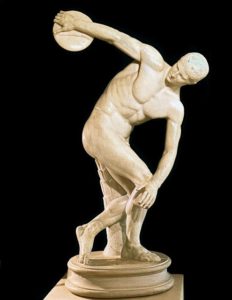 took place and were held every four years thereafter. In 750 BC the Greek alphabet was developed and spread throughout the empire. In 580 BC democracy was put into effect in Athens as the world’s first democracy (yet lasting for only 185 years). The discoveries of Greek mathematicians such as Pythagoras, Euclid, and Archimedes are still used in mathematical teachings today. Greek coin currency was introduced in the 6th century BC during which time Greece became the most advanced economy in the world. In 490 BC the Greeks defeated Persia. However, in the Peloponnesian War from 431 to 404 BC (fought by the Spartans supported by the Persians) Athens’ navy was destroyed. From the view of historians the Greek “Classical Period” began in 776 BC until 323 BC ending with the death of Alexander the Great, effectively bringing an end to the empire in 323 BC having lasted roughly 350 years.
took place and were held every four years thereafter. In 750 BC the Greek alphabet was developed and spread throughout the empire. In 580 BC democracy was put into effect in Athens as the world’s first democracy (yet lasting for only 185 years). The discoveries of Greek mathematicians such as Pythagoras, Euclid, and Archimedes are still used in mathematical teachings today. Greek coin currency was introduced in the 6th century BC during which time Greece became the most advanced economy in the world. In 490 BC the Greeks defeated Persia. However, in the Peloponnesian War from 431 to 404 BC (fought by the Spartans supported by the Persians) Athens’ navy was destroyed. From the view of historians the Greek “Classical Period” began in 776 BC until 323 BC ending with the death of Alexander the Great, effectively bringing an end to the empire in 323 BC having lasted roughly 350 years.
Note: Classicism is defined as an approach to aesthetics (in particular in painting, sculpture, literature, and architecture) that emphasized standard, classic forms of beauty and craftsmanship. The classical period flourished in ancient Greece and Rome, and later throughout Europe in the seventeenth and eighteenth centuries.
The Acropolis
Religious worship, if Greek homage to the Olympians (Zeus, Athena, Apollo, Aphrodite, Hermes, etc.) can be called that, was official. In the city-states the chief magistrate (either politically elected, or a buyer of the office, or chosen by lot) was high priest, so to speak, and it was the politicians who promulgated the state religion. That, along with the spread of intellectual reasoning, caused educated men to fall into a mindset of religious skepticism. The man of deep religious intuition was absent from Greek society and thus influence. However, Greek philosophy somewhat redeemed the shallowness of their polytheistic religion possessing some of the elements of meaningful religious belief. An inherent, throughout all, God did appear, albeit vaguely, in the speculations of profound thinkers such as Socrates and Plato. Plato acknowledged the Olympians only sufficiently enough to stave off persecution whereas Socrates was put to death as an apostate and teacher of heresies and Protagoras was condemned for impiety and died in exile.
(9)
Pythagoras
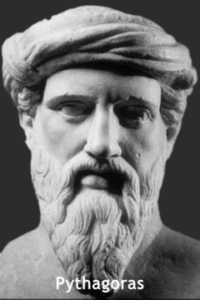 The Greek philosopher Pythagoras (c. 570 – 495 BC) was born on the Island of Samos in the Aegean Sea just off the west coast of Turkey. According to his biographer, Iamblichus of Syria (early in the fourth century after Christ), the test of all that Pythagoras and his followers did, or abstained from doing, was in consonance with divinity; they shaped their lives in accordance with God’s will. In this way Pythagoras departed most of all from other Greek philosophers in their practice of solely rational thought.
The Greek philosopher Pythagoras (c. 570 – 495 BC) was born on the Island of Samos in the Aegean Sea just off the west coast of Turkey. According to his biographer, Iamblichus of Syria (early in the fourth century after Christ), the test of all that Pythagoras and his followers did, or abstained from doing, was in consonance with divinity; they shaped their lives in accordance with God’s will. In this way Pythagoras departed most of all from other Greek philosophers in their practice of solely rational thought.
As a young man he studied with the aged Thales of Miletus. And when Pythagoras finished his studies Thales insisted that he go to Egypt to learn from the priests; the source of Thales’s own reputation for wisdom. It is written that Pythagoras spent 22 years studying with the Egyptian seers. When he returned to the city-state of Samos he achieved fame as philosopher, scientist and teacher. Around 529 BC he emigrated to the Greek city of Crotone in lower Italy where he established his school and brotherhood. And it is from then on that Pythagoreanism spread throughout all of the Greek colonies as well as the states of Greece proper. [The Greek colonies consisted of some 500 colonies so that by 500 BC these new territories accounted for 40% of all Greeks in the Hellenic World].
The initiates of the Pythagorean brotherhoods lived together in communal groups and were celebrated for their holiness. Conduct, not faith or learning, was the test of membership. They could remain at the residential university (quite possibly the earliest in Europe) at Crotone only by strict observance of the rules of abstinence and conduct worthy of the foremost aim of the brotherhoods, that being “consonance with God.”
Eventually politicians and mobs came to resent the influence of the Pythagoreans. Sometimes charges of heresy, and at other times charges of subversive political ambitions stirred the violence. They were attacked, their homes ransacked, their assembly halls burned and some were killed. Around one hundred years after the founding of the school the worst wave of intolerance swept over Greece and Italy. Though the members were thus scattered, bands of Pythagoreans are heard of through the following five centuries. In some isolated cases even, they ruled their towns over the course of generations.
Pythagoras was an eminent scholar in the field of mathematics and astronomy, one of the greatest of ancient times. Pythagoreans were the first to consider the Earth as a globe revolving with the other planets around a central fire; an important advance in ancient scientific thought. He is, of course, best known today for his mathematical equation: the square of the hypotenuse of a right-angled triangle is equal to the sum of the squares of the other two sides; in other words, A^2 + B^2 = C^2.
(10)
Pythagoras is also credited with the discovery of musical intervals and taught that you could heal using sound and harmonic frequencies. He was also the first person to introduce the word philosophia (whereas the word sophia, or sophist [for philosopher], had previously been used). In fact, for a considerable time to be known as a philosopher was to be known as a Pythagorean.
He is the first known seer to have taught in ancient Greece of the divine origin of the human soul and the expectation of immortality. And, not at all to detach from the concept of a benevolent God, he taught of a pervading harmony of the spheres; that being that the heavenly bodies are separated from one another by intervals corresponding to the harmonic lengths of strings (as in musical instruments). Pythagoras held that the movement of the celestial spheres gives rise to a musical sound: the “harmony of the spheres” as it is called. He lived his own life with a saintly purity of purpose and was temperate, strictly limiting his use of wine. Believing in the transmigration of souls, he was a strict vegetarian. Many stories have been told of Pythagoras’ kinship with animals, not unlike those concerning the Taoist and Hindu sages, and similar to the legends of Saint Francis of Assisi.
“Pythagoras had rendered so subtle his powers of inward hearing that he vibrated to the sublime symphony of the universe. He heard and transmitted the harmonious order and resonance of the spheres and of the stars that move in concert with them producing a melody fuller and more profound than is possible without divine penetration … Pythagoras conceived that this music arose out of the central spring and origin of the universe.”
Pythagoras did not urge celibacy upon his followers. In fact, he had a wife and children. Yet he trained the young people of the community to abhor licentiousness and to combat the cravings of the senses. He was also the first teacher in Greece to admit women to higher education.
As an aside, American Ivy League colleges did not admit women until the 20th century. In the case of Columbia University women were admitted as late as 1981, Yale in 1969, Princeton in 1969, Brown in 1971 (when its women’s college, Pembroke, merged with Brown), and Harvard in 1977 (when Harvard and Radcliffe merged).
The Greek philosopher Pythagoras, the Chinese sage Lao-Tsu, and then much later the American Transcendentalists, Emerson and Thoreau, are not at all unalike in their acknowledging the divine in nature; its natural harmonious universal order, and that we too can attune ourselves to this life-giving force, commune with its perfection.
(11)
Plato
Of Plato (c. 428 – 348 BC) the essayist, lecturer, and poet Ralph Waldo Emerson (who, during the 1880s led the American Transcendentalist movement; a movement away from materialism and toward nature for spiritual guidance) said that the philosopher was inclined toward Oriental transcendentalism (as in Lao-Tse’s Taoism) having incorporated conceptions of the unbounded Infinite into the Western science-bound philosophy. Unfortunately, Plato’s inclination toward Oriental transcendentalism little affected the Greek nation and the Greeks continued on a course marked by religious dispersion and moral degeneration eventually leading to their national heritage being utterly destroyed.
Platonism never thereafter dies. But, the schools of philosophy that immediately grow out of the master’s teachings neglect the mystical aspect; they are scientific, utilitarian and Godless. For, reason had become the keystone of the structure of Greek philosophy and Plato had introduced doctrines repugnant to the apostles of so-called “realistic” thinking. Except for intimations and rare allegories about his belief in the unity of All that Is, the omnipotence of God, and the good that the soul may experience when it enters into “divine company” he was forced to pay homage, to some degree, to the gods of the official pantheon thus compromising his faith.
Both of his parents were of aristocratic pedigree and Plato was raised and educated as a noble. His father died early and he was raised by his great uncle who was prominent in the political life of Athens. Other relatives were also prominent political figures and Plato was, it seemed, destined for a political career. Socrates was a friend of the family and at eighteen the youth became one of the old philosopher’s followers for three or four years. Other than the typical education in literature, mathematics, music, rhetoric, and athletics he probably studied with other philosophers as well, being that Athens was a meeting ground for sophists popularizing wisdom and specializing in rhetoric, and willing to teach for a fee.
When Plato was a young man Athens was politically chaotic. He was shocked by the violence, dishonesty and criminality of the Thirty Tyrants, a brief eight-month oligarchy, including a close relative of his, that while they ruled Athens it disintegrated into a dissentious and weak democracy. When this state of rule led to the execution of the wise and benevolent Socrates, Plato renounced politics for good. He could not stomach the political practices of his own set and thought democracy hardly better than mob rule. He was absent, by reason of illness, from the group of disciples and friends present when Socrates drank the hemlock.
(12)
Following this he travelled extensively in Greece then went to Egypt to study the religion and thought of that ancient and advanced culture. Upon returning home he still found the Athenian atmosphere uncongenial and proceeded to Italy where friends led him to one of the Pythagorean communities given that his former teacher, Socrates, had been deeply influenced by Pythagorean beliefs. And there, he too was much influenced.
Prior to sailing home Plato went to the famed Mt. Etna, an active volcano off the east coast of Sicily, then onward to Syracuse, Italy, where he displeased the Tyrant of Syracuse with his views on good ruling. The Tyrant took revenge by betraying him to the Spartan ambassador there which led to Plato being put up for sale in the slave market in Aegina; an island off the coast of Greece near Athens, and a rival of Athens. (Recall that the Spartans fought Athens during the Peloponnesian War from 431 to 404 BC).
Plato was recognized and bought by an admirer who freed him. He then made his way back to Athens. In Athens some wealthy friends who had heard of his misadventure collectively put together a purse in repayment for his ransom yet the admirer refused to be reimbursed. Plato then used the money to establish a school of wisdom based, in part, on the model of the Pythagorean communities.
About a mile from Athens Plato established the institution of his dreams, the Platonic Academy, destined to be, during its nine centuries of service to learning, one of the greatest universities in Europe. The name was derived from the surrounding park belonging to a man named Akademos – who thereafter unintentionally became the namesake of thousands of academies through the ages. The rest of Plato’s life (he was in his early forties by this time) was given largely to teaching mathematics and philosophy at the Academy.
The Academy placed less emphasis on the spiritual life than did the Pythagorean communes, but technically it was still a religious institution largely dedicated to the Muses (nine goddesses, the daughters of Zeus, in Greek and Roman mythology who preside over the arts and sciences). The concept of an All that Is, an all permeating God, was taught to the students (women as well as men) as an aspect of philosophy. Regardless, there was an absence of the spiritual and transcendental ideals known to the Pythagoreans.
(13)
The atmosphere of the Academy was intellectual and of the many distinguished philosophers and scientists who studied under Plato, none became noted spiritual leaders. Aristotle, the most famed of the graduates, developed a formalized system of reasoning combined with his belief in the scientific method. To elaborate further, Aristotle distinguished sense perception from intellectual reason; reason being that which unifies and interprets the sense perceptions, and is the source of all knowledge.
One of Plato’s own disciples had gone to the Sicilian city on an idealistic mission, to convert a tyrant, yet turned traitor and murderer, seized the ruling power, and for a brief period became a tyrant himself. The Academy thus fell into disrepute. Nevertheless, serenity returned toward the end of Plato’s life and he went on further to teach and write. He died in his eighty-first year.
“The Republic,” Plato’s best known works, written in the form of a Socratic dialogue where Socrates discusses the meaning of justice and the order and character of a justly ruled city-state is considered one the world’s most influential works of philosophy and political theory, both intellectually and historically.
On the other hand, the transcendentalism implied in Plato’s teachings did not come into full fruition for yet another two hundred years following the birth of Christ when the Greek nation had, by then, been under foreign rule for five hundred years. It is Plotinus (204 – 270 AD) of Roman and Egyptian heritage, trained in the Greek schools of Alexandria, Egypt, who (writing in Greek) placed less emphasis on the scientific and political leanings in Platonism doctrine and brought to life the full Oriental spiritualism of Plato’s teachings. Plotinus is considered the founder of what is referred to as Neo-Platonism and was the forebearer of many of the great mystics of the Christian Church. Initially Neo-Platonism swept back into Plato’s Academy as a rival to Christianity yet also made its way into the Christian Church through Augustine (who had been schooled in Plotinus’ Enneads, which is referred to later, prior to his conversion).
(14)
The Platonic Solids:
The ancient Greeks studied the Platonic solids extensively. Some sources credit Pythagoras with their discovery whereas other evidence suggests that he may have only been familiar with the tetrahedron, cube, and dodecahedron, and that the discovery of the octahedron and icosahedron belongs to Theaetetus, a contemporary of Plato. In any case, Theaetetus gave a mathematical description of all five and may have been responsible for the first known proof that no other convex regular polyhedron exists.
The Platonic solids are prominent in the philosophy of Plato, their namesake. Plato wrote about them in the dialogue “Timaeus” (c. 360 BC) in which he associated each of the four classical elements (earth, air, water, and fire) with a regular solid. Earth was associated with the cube, air with the octahedron, water with the icosahedron, and fire with the tetrahedron.
Euclid mathematically described the Platonic solids in his book the “Elements” (in the last book, Book XIII) which is devoted to their properties. For each solid Euclid found the ratio of the diameter of the circumscribed spheres (around the solids) to the lengths of the edges.
In the 16th century, the German astronomer Johannes Kepler attempted to relate the six 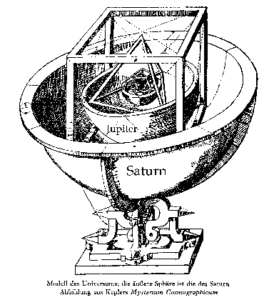 extraterrestrial planets (known at that time) to the five Platonic solids. Kepler proposed that the distance relationships between the six known planets could be understood in terms of the five Platonic solids enclosed within five spheres within an outermost sphere that represented the orbit of Saturn. In the end, Kepler’s original idea had to be abandoned, but out of his research came his three laws of orbital dynamics, the first of which was that the orbits of planets are ellipses rather than circles. An etching of this was published in Kepler’s book on astronomy titled “Mysterium Cosmographicum” [the cosmographic mystery] on the right.
extraterrestrial planets (known at that time) to the five Platonic solids. Kepler proposed that the distance relationships between the six known planets could be understood in terms of the five Platonic solids enclosed within five spheres within an outermost sphere that represented the orbit of Saturn. In the end, Kepler’s original idea had to be abandoned, but out of his research came his three laws of orbital dynamics, the first of which was that the orbits of planets are ellipses rather than circles. An etching of this was published in Kepler’s book on astronomy titled “Mysterium Cosmographicum” [the cosmographic mystery] on the right.
(15)
Plotinus
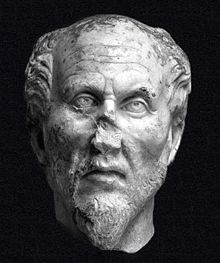 Plotinus (204 – 270 AD) was born in the ancient city of Lycopolis, Egypt nearly six centuries following the birth of Plato . And, these were centuries of glory and turbulence: religions came and went; the Olympian gods were becoming hardly more than a literary memory. Alexander the Great (356 – 323 BC) had conquered territories in Africa and Asia. Following the campaigns of Alexander was a period referred to as the Hellenistic Period: the historical spread of ancient Greek culture and, to a lesser extent, language, over foreign peoples conquered by the Greeks and thus into their realm of influence from 323 BC to 31 AD. Prior to that however, Alexandria in Egypt (founded by Alexander in 331 BC) had become a center of learning more celebrated than Athens. Rome had ascended when Augustus Caesar became the first Emperor in 31 AD (its fall occurring around five centuries later, in 476 AD when the last Roman Emperor, Romulus Augustus, was deposed by the Germanic King Odoacer in 476 AD). Christianity had been born two centuries prior to Plotinus’s birth and had already effected a considerable spiritual influence that crossed over territorial divides and political aims.
Plotinus (204 – 270 AD) was born in the ancient city of Lycopolis, Egypt nearly six centuries following the birth of Plato . And, these were centuries of glory and turbulence: religions came and went; the Olympian gods were becoming hardly more than a literary memory. Alexander the Great (356 – 323 BC) had conquered territories in Africa and Asia. Following the campaigns of Alexander was a period referred to as the Hellenistic Period: the historical spread of ancient Greek culture and, to a lesser extent, language, over foreign peoples conquered by the Greeks and thus into their realm of influence from 323 BC to 31 AD. Prior to that however, Alexandria in Egypt (founded by Alexander in 331 BC) had become a center of learning more celebrated than Athens. Rome had ascended when Augustus Caesar became the first Emperor in 31 AD (its fall occurring around five centuries later, in 476 AD when the last Roman Emperor, Romulus Augustus, was deposed by the Germanic King Odoacer in 476 AD). Christianity had been born two centuries prior to Plotinus’s birth and had already effected a considerable spiritual influence that crossed over territorial divides and political aims.
Plotinus reportedly would experience complete deliverance from the mortal state and into assimilation with the Divine (referred to today as enlightenment). Therefore, so little did he esteem the physical life, other than honoring the soul that has come down to the earthly plane thus inhabiting the body. Plato proposed an intellectual approach to mystical thought whereas Plotinus plunged into mystical union with God. Life, he believed, should be lived in awareness of the Divine and in expectation of the communion and the euphoria and blessedness that communion affords. Imagery, he thought, of every sort capable to man belonged to the separated man: thus the experience of the temporal, mortal world.
Alexandria, in the third century, was the melting pot of religions just as it was the city for museums, libraries and schools. It was ruled by the Greek kings yet there were temples to worship the Egyptian Gods alongside schools of Greek philosophy. There were Jewish synagogues and Jewish colleges, schools specializing in Oriental spiritual teachings, as well as Christian congregations and preachers. It is somewhere in Egypt, into this diverse, bustling religious, learned, and philosophical community that Plotinus was born of Hellenized or Romanized parents.
(16)
According to his biographer and disciple, Porphyry (in 303 AD), it was around the age of twenty-eight that Plotinus was seized by a passion for philosophy. He then studied with Ammonius Saccas whose teachings were based on the comprehension of Platonic concepts yet not including the Oriental mysticism (Taoism and some Buddhism) at the core of Platonism. Ammonius is said to have been born of Christian parents though he became indifferent to Christianity finding a sufficient spiritual philosophy in the wisdom of the Greeks. He adhered to Plato above all other seers and there are occasions where he, rather than Plotinus, is considered the founder of Neo-Platonism. Once Plotinus had spent a decade with Ammonius he then headed eastward to learn of, first hand, the wisdom of the Magi and the Brahmins, and perhaps the Buddha as well.
Plotinus joined an invading army under the Roman Emperor Gordianus to recover Mesopotamia from the Persians. And, though the Persians were defeated, mutinies and the murder of the Emperor put an end to his plans go to India. Instead, following considerable hardship, in 244 AD at the age of forty, he made his way to Rome where he settled permanently.
Over the course of the next nineteen years Plotinus composed his twenty-one short philosophical treatises which were unpolished with misspellings and grammatical errors; little more than notes from his lectures. Though he had organized a school where he taught a philosophical approach to life along the lines taught him by Ammonius, he modified it based on his own devotion toward a saintly code of ethics and his passion for divine communion. His mind was so fecund that he failed to pause to fit the full content of his words to the idea. He apparently spoke just as he wrote, “all in one burst, after storing his mind.” However, had it not been for Porphyry his writings might never have been put into intelligible form.
Although he had pledged to Ammonius not to divulge his teachings except to those whom could be considered serious initiates, as he became a famous philosopher and saint (on his own account and as well as on the wisdom imparted to him by Ammonius) he yielded to the solicitation of his disciples and gave the manuscripts to Porphyry. Additional treatises were composed, and in the end, there were texts of fifty-four discourses. The collection is called “The Enneads.”
Rome in the third quarter of the third century was in the midst of widespread suffering the result of the plague, political chaos, and unending alarms of wars. Life was difficult for rich and poor alike. The guardians of wealthy orphaned children placed them in Plotinus’ care and his house was full of boys and girls. Regardless, his small community carried on its search for wisdom undisturbed. For, the philosophy of the master admitted no catastrophe as being profound or final except the failure to live and act nobly in accord with Spirit. It was said that when Plotinus spoke he “seemed to increase in beauty, the light of his soul visibly shining in his face.” His commune was a place of serenity and peace in the troubled and feverish capital of a disintegrating empire. Porphyry’s own testimony of Plotinus recalls that “The one aim of his life was to rise to God and become one with Him. Four times during the time I was with him, he achieved this relation, not as mere passive mergence, but by the ineffable act.”
(17)
There is a characteristic passage in the fifth “Ennead” that indicates how far he had gone beyond any experience which Plato, with his intellectual approach, was capable of: “… souls suffused with this Beauty, cannot look merely at life’s surface. Theirs is a profound inner vision of the Divine Being. Thus possessed of God, the man has only to look to the image of Divinity within and sees himself uplifted, gifted with a nobler beauty.”
Among Plotinus’ converts was the Senator Rogatianus who gave away all of his property in order to live the life of a philosopher and ascetic. There were other prominent followers, among them: other political leaders, physicians, and writers as well as numerous students whose sole business was the pursuit of wisdom. Women, in spite of their inferior position socially and culturally in all quarters of the empire, were accepted as members of the community just as they had been by many religious teachers since Pythagoras.
When Porphyry had published (that is, made it available for copying by scribes) “The Enneads” the Plotinian writings went on to profoundly influence both Greek and Christian philosophy. The greatest effect was upon western Christianity through Saint Augustine, Saint Jerome, Gregory 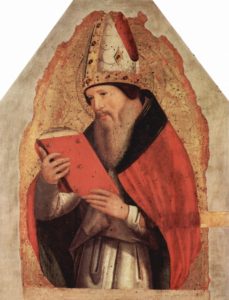 the Great, and other luminaries of the Church inspired by Plotinus; the prophet of Neo-Platonism. In fact it was Saint Augustine who fixed Plotinus’ place as the new Plato. Augustine wrote “The message of Plato, the purest and brightest in all philosophy … has shone forth most clearly in Plotinus.” And of Plotinus and the mystical experience in “The City of God” Augustine wrote, “The beholding of God is a vision so beautiful and so transcendently desirable that Plotinus does not hesitate to say that, failing this, he who enjoys all other blessings in abundance is nevertheless supremely bereaved.” In his “Confessions” Augustine tells of Plotinus’ part in furthering his own personal conversion; one of the most marvelous and fruitful in the annals of religion. Thus Augustine acted as a spiritual intermediary between Plotinus, the last of the great Greek pagan philosophers, and the Christian church which was to become the guide of religious thought in Europe for sixteen centuries thereafter.
the Great, and other luminaries of the Church inspired by Plotinus; the prophet of Neo-Platonism. In fact it was Saint Augustine who fixed Plotinus’ place as the new Plato. Augustine wrote “The message of Plato, the purest and brightest in all philosophy … has shone forth most clearly in Plotinus.” And of Plotinus and the mystical experience in “The City of God” Augustine wrote, “The beholding of God is a vision so beautiful and so transcendently desirable that Plotinus does not hesitate to say that, failing this, he who enjoys all other blessings in abundance is nevertheless supremely bereaved.” In his “Confessions” Augustine tells of Plotinus’ part in furthering his own personal conversion; one of the most marvelous and fruitful in the annals of religion. Thus Augustine acted as a spiritual intermediary between Plotinus, the last of the great Greek pagan philosophers, and the Christian church which was to become the guide of religious thought in Europe for sixteen centuries thereafter.
The philosophic life, says Plotinus, is the life that finds the good, that is, finds the God. Happiness is not in the things men do and acquire, but in a habit of mind “To hinge happiness on events, is to hinge it upon matters outside the Good and independent of the soul.” (He often interchanges the words Good and God). “The soul has its life not in events but in wisdom, in a contemplative experience of its own. This, and this only, is happiness.” Yet he goes on to warn that happiness is to be gained, not by withdrawal from life, but rather by detecting the opportunity to find Divinity in all the world.
(18)
The image Porphyry gives us of Plotinus is of an active saint. Having firmly in his mind the quality of Good, he spontaneously finds and attracts the good in the world. The Good [God] is the normal thing and it is ever present, even to those who are “asleep” in regards to the presence of God. “In each of us there is something of the eternity.” Evil is shut out, because “All who have possessed themselves of the Good find it sufficient.” Therefore, “Ones aspiration is less away from evil than toward the highest and noblest comprehensible to the soul; this attained, all else has been won, thus peace, the intended condition of life.” For, he taught, evil for the soul is in tolerating that which is strange to its true nature.
Plotinus was somewhat skeptical of medical science and was often short with doctors whom, he observed, became so absorbed in physical symptoms and curatives that they forget that healing arises out of harmony in the soul. Nevertheless, the physician Eustochius became one of his most devoted disciples and a beloved companion. When in his last year, Plotinus fell seriously ill of a throat infection, he left Rome and went to an estate in Campania. He then sent for his friend Eustochius. But, the latter was delayed in arriving at the bedside so that the saint, as it were, was obliged to put off dying. When the doctor came Plotinus said only these words, “I have been waiting for you. Now I shall restore the Divine in me to the Divine that is All,” and his spirit left the body. This was in the year 270 AD.
It is a basic Neo-Platonic belief that the soul has come down to this world; that birth is brought about by the descent of the soul. Yet some of our soul ever remains within the Divine sphere although, often losing touch (though never completely) with the ever present Divine. Nevertheless, the soul in the world can be at peace as long as it recognizes its origin and its oneness with the Supreme Soul and seeks that which is of Divine nature within and all about itself (or its Self in contemporary spiritual parlance).
Plotinus is more a Taoist than Christian or Jewish in his conception of the universe in relation to God. God, he taught, is not in the world but rather the world is in God for, the Absolute is so great that there is nothing that can contain Him. He does not come down by favor, to help men. Rather, men are intuitively aware of Him, of His Nature, and carrying on a separately created world in recollection of His Love, of His Creation. [Here I must add that in “A Course in Miracles” Christian teachings do not at all contradict Plotinus’ view of the Absolute. Since the time of Christ there have been and still are many misconceptions and misquotes regarding Christ’s teachings]
Sources: “Men Who Have Walked With God” by Sheldon Cheney, the “Internet Encyclopedia of Philosophy,” the “Stanford Encyclopedia of Philosophy,” Wikipedia, and others.
(19)
******
To continue reading the next chapter (N) Leo Tolstoy – The Divine as Misunderstood by Men of Science click on the menu above or:
https://miraclesforall.com/leo-tolstoy-on-the-divine-misunderstood-by-men-of-science/
